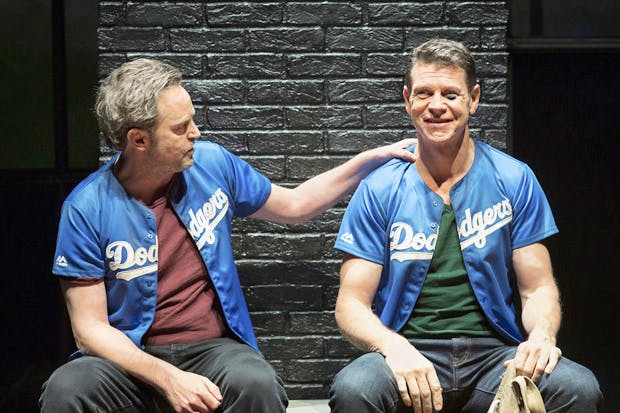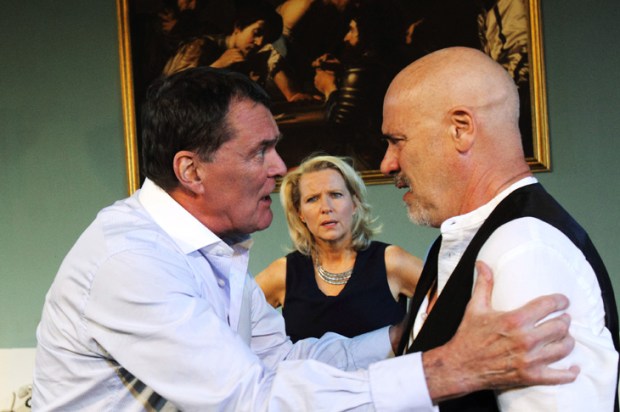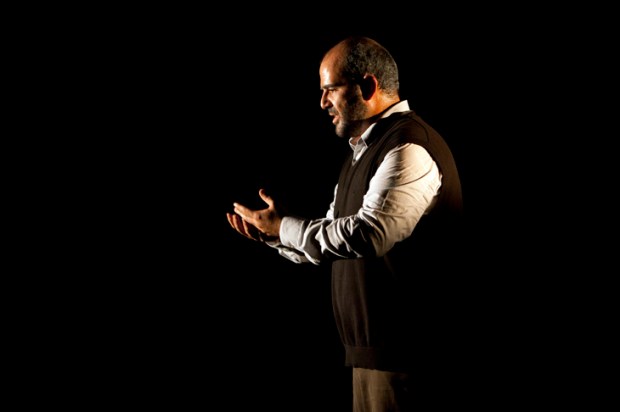Here’s how to set yourself up for a fall. You stage the world première of your debut play in the West End and you cast yourself in the lead role. Matthew Perry (Chandler Bing from Friends) has invited a critical monstering by brazenly challenging all-comers like this and the result is a terrible let-down. For the reviewers, that is, who have mindlessly attacked this breezy, stylish new dating comedy. It’s not perfect but it succeeds on many levels. It’s pacy, original and easy on the eye. It’s funny throughout (apart from a bizarre scene in a maternity unit, which suggests, rather bafflingly, that no member of the creative team has a clue what happens to a woman during labour).
The characters are strong urban archetypes whose problems are simple to identify with. The acting is fine, the costumes are swish and the sets are darkly suggestive of that troubled twilight journey that takes us from the dating table to the family hearth. Settling down is the play’s theme. Perry plays Jack, a ‘professional alcoholic’, who cracks open his first drink of the day at breakfast-time. He’s superficially arrogant but his self-knowledge makes him charming. ‘Life?’ he says of his addiction. ‘I never touch the stuff.’ This self-destructive gadabout becomes entangled with a high-end call-girl whose career in ‘executive horizontal liaison’ earns her two thousand bucks an hour. After their first night together Jack faces a dilemma. Where does gallantry lie? If he pays her, he treats her as a tart. If he withholds payment, he signals romantic feelings but risks appearing tight. He offers the money. She declines. ‘You’re mildly charming,’ she says. ‘And my dad was never there for me.’ These two throwaway statements are complex and revealing. The first is a haughty compliment intended as a cagey invitation. The second is an expression of emotional need that is also an ironic act of self-exculpation. The layers are there for those willing to see them.
These cosmopolitan strugglers are joined by two mismatched lovers. Joseph (Lloyd Owen) is a thick but amiable hunk whose fling with an uptight bombshell, Stevie, results in her becoming pregnant. To Stevie’s amazement, Joseph offers to support her and raise the child. Deeply suspicious, she questions his motives while threatening him with a spoon. Great detail, the spoon. It’s a kitchen utensil, like a knife, but with overtones of nutritive love and maternal care. Such subtleties reinforce the show’s sense of thoughtful artistry. A pity the reviewers missed them. The play, let’s be honest, is unlikely to become a permanent addition to the light-entertainment repertoire but it’ll turn a healthy profit because it satisfies the need for slick, old-fashioned fun. It reminded me of those frothy Hollywood comedies from the 1950s. I could imagine James Stewart playing the damaged lush and Marilyn Monroe doing her tender-hearted hooker routine. The play is shrewdly pitched at all sections of the populace. Old folk will enjoy recalling how gruesome it was being 38 and unattached. Kids will get a glimpse of what’s ahead. And the core audience of thirtysomethings will watch in amused wonder as their own chic selves are reflected back to them with style, grit and humour. This is what the West End needs. Smart, sexy comedies that make pots of cash. Kerching, Mr Bing.
David Lindsay-Abaire is best known for Good People, a hilarious melodrama about class and betrayal that transferred from Hampstead to the West End in 2014. His 2006 play, Rabbit Hole, is a tougher, mellower, sadder ride. The plot sounds like a public-information film about fastening gates. Becca and Howie lost their four-year-old boy after he chased the dog across the road and was struck by a car driven by a speeding teen. Becca’s sister, Izzy, is expecting a baby and this brings their mother into the story and triggers memories of her youngest son who became addicted to heroin and hanged himself. So we have two dead offspring and two grieving mums: heaps of Kleenex required. Lindsay-Abaire is superb at writing women and there are sublime scenes between the females that are tender, cruel and funny all at once. His men are feebler creations. Howie is angry and repressed. And Jason, who seeks forgiveness from the family, is a chirpy, eager-eyed innocent. But neither is more than a silhouette. And the show is tricky to experience at a visual level. The narrow Hampstead stage has to accommodate a kitchen-diner, a kiddie’s abandoned bedroom upstairs, a TV suite on a sort of lookout platform, and a floating space where Jason expresses his confused torment to the audience. Ed Hall directs this harrowing play with his customary assurance. And anyone willing to be dragged over the coals of grief, and the fear of grief, is guaranteed a memorably gruesome night.
Got something to add? Join the discussion and comment below.
Get 10 issues for just $10
Subscribe to The Spectator Australia today for the next 10 magazine issues, plus full online access, for just $10.














Comments
Don't miss out
Join the conversation with other Spectator Australia readers. Subscribe to leave a comment.
SUBSCRIBEAlready a subscriber? Log in